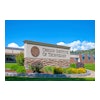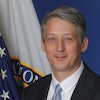Jewish students find themselves in fear and facing sadness on their college campuses ever since the Oct. 7 Hamas attack on Israel, according to a recent survey by Jewish campus organization Hillel International. Adam Lehman
Adam Lehman
The online survey – conducted by market research firm Benenson Strategy Group for Hillel International from Nov. 14-15 – included 300 Jewish college students.
The survey found that 51% of U.S. respondents reported feeling less safe on campus than they did prior to the Oct. 7 attacks, according to Adam Lehman, president and CEO of Hillel International.
Oct. 7, 2023, marked the day terrorist group Hamas’s suddenly attacked a music festival that was occurring in Israel, with more than 1,400 Israelis killed and more than 240 taken hostage, according to Israeli officials. Since the attack, Israel has struck back and has been at war with the group in Gaza, the dedicated assault resulting in more than 10,000 Palestinians dead, according to Palestinian officials.
The ongoing conflict has polarized many in the U.S., including on college campuses, where student walkouts and demonstrations have arisen in support for both sides. There have also been calls to protect free speech for faculty amid these rising tensions.
According to the survey, 84% of Jewish students said the situation in Israel and Gaza is affecting them, with 68% reporting feeling sadness and 54% scared. What the students were asked was broad.
"The survey question that they were responding to is as follows: 'How is the news in Israel and Gaza making you feel?' So, it was not specific to any one aspect of what's happening with the war,” Lehman said. “But I think that also is relevant because the students surveyed not only expressed, in [the] vast majority of cases, feeling sad but also frustrated, angry, scared, and helpless."
According to the survey, students are feeling the need to hide their Jewish identities – 37% said they needed to. And 35% have said that there have been acts of hate or violence against Jewish people on campus.
The survey findings come amid immense levels of campus antisemitism since the Oct. 7 attacks, Lehman said, adding that there have been more than 500 reported incidents of antisemitism in the last six weeks, including 33 physical assaults against Jewish students. The over 500 incidents – a 1,000% increase from any prior six-week period Hillel International has recorded – include vandalism and hate speech, among other forms of harassment and intimidation, he said.
Attacks and harassments seem to be targeting both Jewish and pro-Palestinian students, according to experts.
Brown University senior Jillian Lederman, chair of Hillel’s Israel Leadership Network and president of Brown Students for Israel, said that the survey’s results were heartbreaking but not shocking.
She mentioned incidents on campus of people holding Israel and the Israeli government solely responsible for all violence against Israelis and Palestinians; a protester glorifying Hamas as martyrs; posters of kidnapped civlians being torn down or alleged to be Israeli propaganda; and personal claims against her that she supported genocide.
“My experience on campus over the past [more than] six weeks is very reflective of the survey results when people say they are forced to hide their Jewish identity, when people say that they are scared about violence or harassment against Jews on campus,” Lederman said. “That is something that I have experienced, that has been prevalent at Brown and at many other schools across the country.
“We're in a situation now where over a third of students are saying that there's been violence or acts of hate against Jews on their campuses. That's a huge number. ... It's something that universities have a responsibility to address [and] combat, and many of them are failing at that responsibility."
More than half (53%) of survey respondents reported dissatisfaction with how their school was responding to violence and hate on campus, Lehman said. And the majority of Jewish students who answered (78%) said that Jewish spaces are more important now than ever before.
"The current situation Jewish students are facing on campus is additionally leaving them frustrated and angry,” Lehman said. “And I think that is in part a reflection of the fact that they were surprised to see so little empathy, in terms of their own identities and experiences following the Oct. 7 terrorist attacks, from other students, faculty, and staff. Additionally, they have seen so little sensitivity directed towards Jewish student communities in the six weeks since, and instead have faced so much demonization of not only Israel but of Jews as part of the fallout from the war in Gaza."


















